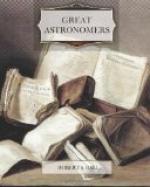GALILEO.
Among the ranks of the great astronomers it would be difficult to find one whose life presents more interesting features and remarkable vicissitudes than does that of Galileo. We may consider him as the patient investigator and brilliant discoverer. We may consider him in his private relations, especially to his daughter, Sister Maria Celeste, a woman of very remarkable character; and we have also the pathetic drama at the close of Galileo’s life, when the philosopher drew down upon himself the thunders of the Inquisition.
The materials for the sketch of this astonishing man are sufficiently abundant. We make special use in this place of those charming letters which his daughter wrote to him from her convent home. More than a hundred of these have been preserved, and it may well be doubted whether any more beautiful and touching series of letters addressed to a parent by a dearly loved child have ever been written. An admirable account of this correspondence is contained in a little book entitled “The Private Life of Galileo,” published anonymously by Messrs. Macmillan in 1870, and I have been much indebted to the author of that volume for many of the facts contained in this chapter.
Galileo was born at Pisa, on 18th February, 1564. He was the eldest son of Vincenzo de’ Bonajuti de’ Galilei, a Florentine noble. Notwithstanding his illustrious birth and descent, it would seem that the home in which the great philosopher’s childhood was spent was an impoverished one. It was obvious at least that the young Galileo would have to be provided with some profession by which he might earn a livelihood. From his father he derived both by inheritance and by precept a keen taste for music, and it appears that he became an excellent performer on the lute. He was also endowed with considerable artistic power, which he cultivated diligently. Indeed, it would seem that for some time the future astronomer entertained the idea of devoting himself to painting as a profession. His father, however, decided that he should study medicine. Accordingly, we find that when Galileo was seventeen years of age, and had added a knowledge of Greek and Latin to his acquaintance with the fine arts, he was duly entered at the University of Pisa.
Here the young philosopher obtained some inkling of mathematics, whereupon he became so much interested in this branch of science, that he begged to be allowed to study geometry. In compliance with his request, his father permitted a tutor to be engaged for this purpose; but he did so with reluctance, fearing that the attention of the young student might thus be withdrawn from that medical work which was regarded as his primary occupation. The event speedily proved that these anxieties were not without some justification. The propositions of Euclid proved so engrossing to Galileo that it was thought wise to avoid further




